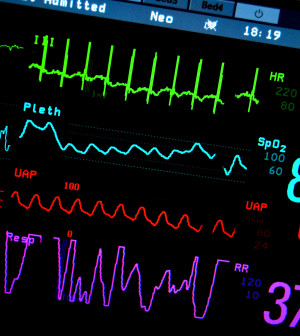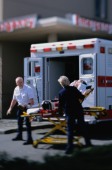- Recognizing the Signs of Hypothyroidism
- 10 Strategies to Overcome Insomnia
- Could Artificial Sweeteners Be Aging the Brain Faster?
- Techniques for Soothing Your Nervous System
- Does the Water in Your House Smell Funny? Here’s Why
- Can a Daily Dose of Apple Cider Vinegar Actually Aid Weight Loss?
- 6 Health Beverages That Can Actually Spike Your Blood Sugar
- Treatment Options for Social Anxiety Disorder
- Understanding the Connection Between Anxiety and Depression
- How Daily Prunes Can Influence Cholesterol and Inflammation
Timing of Heart Attack Tied to Death Risk


Heart attack patients are more likely to die if they arrive at the hospital at night or on a weekend, a large new review finds.
The report also said that this increased risk may result in thousands of extra deaths among heart attack patients in the United States every year.
Mayo Clinic researchers Dr. Henry Ting and colleagues analyzed 48 studies that included a total of nearly 1.9 million patients to assess how arriving at hospitals during nights and weekends affected heart attack patients’ risk of death. The studies were conducted in Canada, Europe and the United States.
The investigators concluded that heart attack patients who arrived at a hospital during off-hours had a 5 percent higher risk of death both while in the hospital and 30 days after discharge than those who arrived during regular hours. This led to an extra 6,000 deaths every year in the United States alone, according to the findings published Jan. 21 in the online edition of the BMJ.
The Mayo Clinic team also estimated that for patients who had a type of heart attack called “ST elevation myocardial infarction” (STEMI) and arrived at the hospital during off-hours, a delay of nearly 15 minutes between arrival and undergoing balloon angioplasty to open a blocked coronary artery could increase death risk by as much as 10 percent to 15 percent.
The researchers said further studies are needed to examine factors that cause differences in levels of care during regular and off-hours, such as number of staff and their level of expertise.
Although the review found an association between arriving at a hospital during off-hours and a higher risk of death among heart attack patients, it did not establish a cause-and-effect relationship.
Patients who arrive during off-hours “experience delays in urgent care and worse outcomes, and the gap seems to be increasing over time,” University of Toronto doctors wrote in an accompanying editorial.
Hospitals seeking to improve their care of heart attack patients “should focus on improving their off-hour care, with the goal of providing consistently high-quality care 24 hours a day and seven days a week,” the doctors wrote.
More information
The U.S. National Heart, Lung, and Blood Institute has more about heart attack.
Source: HealthDay
Copyright © 2026 HealthDay. All rights reserved.










